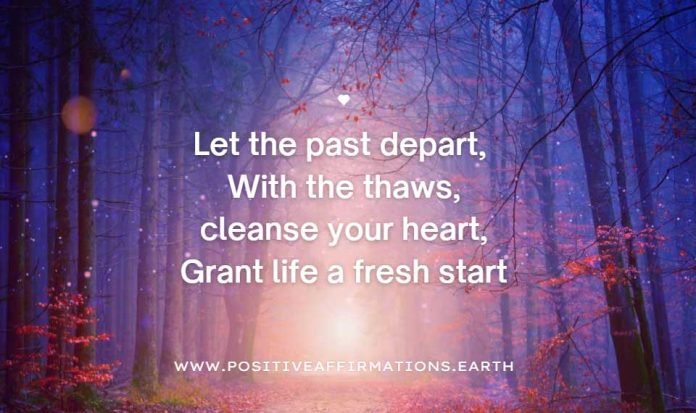We’ve all been there. A difficult life event, a personal loss, a divorce, a crushing disappointment. Life has a way of tossing us into the winter season of our hearts. However, there’s a profound wisdom in the Haiku, “Let the past depart, With the thaws, cleanse your heart, Grant life a fresh start.” Here, we’ll unravel this wisdom and explore practical strategies that help individuals move forward.
Acceptance and Letting Go
The first line of the Haiku, “Let the past depart,” suggests acceptance and the act of letting go. Acceptance is a crucial first step in dealing with any life challenge. It’s about acknowledging the reality of your situation without trying to change, deny, or minimize it1.
A powerful technique for fostering acceptance is the practice of mindfulness, which involves staying present and fully engaging with your experiences2. Mindfulness meditation can help individuals accept their experiences, including negative feelings and thoughts, without judgment.
The act of letting go also involves forgiving yourself and others involved in the incident. Forgive not because they necessarily deserve forgiveness, but because you deserve peace3. Seeing a professional counselor can be beneficial in navigating this process.
Inner Cleansing
The Haiku’s second line, “With the thaws, cleanse your heart,” metaphorically suggests an inner cleansing process. It’s about working through the residue of pain, resentment, or fear that lingers after a traumatic event.
Journaling can serve as a useful tool for this. Writing down your thoughts and feelings can provide an outlet for emotions and facilitate the cleansing process4.
Counseling can be particularly helpful here as well. A counselor can guide you in exploring your feelings and challenge any lingering negative self-perceptions. They can also provide cognitive-behavioral strategies to help reframe negative thoughts and promote healthier thinking patterns5.
Embrace A Fresh Start
The final line of the Haiku, “Grant life a fresh start,” inspires hope. It suggests that, despite past hurts, a new beginning is possible.
Establishing a new routine can be beneficial here. Fresh routines can symbolize a new start and help you move forward6. Try incorporating healthy activities into your daily routine like physical exercise, which has been shown to reduce stress and improve mood7.
Positive affirmations can also facilitate a fresh start. These are positive statements that help overcome self-sabotaging thoughts. They can help you to embrace positivity, stay focused, and motivate you in your journey8.
The Role of Counselors, Meditation, and Affirmations
Professional counselors, mindfulness meditation, and positive affirmations play integral roles in this process.
Counselors provide a safe space to express feelings and facilitate the healing process. They can guide you through different stages of moving on, providing support, empathy, and evidence-based strategies9.
Mindfulness meditation helps individuals stay present and accept their experiences without judgment. It’s been linked with lower stress levels, improved mental health, and better quality of life10.
Finally, positive affirmations, as mentioned, can help overcome self-sabotaging thoughts and instill a more positive mindset. They are an effective strategy to enhance self-esteem, reduce stress, and promote overall well-being11.
In conclusion, starting over after a difficult life event can be challenging, but it’s far from impossible. Acceptance, inner cleansing, and embracing a fresh start are vital steps in this journey. Professional help, mindfulness meditation, and positive affirmations serve as powerful tools to aid in this process.
References
Footnotes
- Hayes, S.C., Luoma, J.B., Bond, F.W., Masuda, A., & Lillis, J. (2006). Acceptance and Commitment Therapy: Model, processes, and outcomes. Behaviour Research and Therapy, 44, 1–25. ↩
- Kabat-Zinn, J. (2003). Mindfulness‐Based Interventions in Context: Past, Present, and Future. Clinical Psychology: Science and Practice, 10(2), 144-156. ↩
- Enright, R. D., & the Human Development Study Group. (1996). Counseling within the forgiveness triad: On forgiving, receiving forgiveness, and self-forgiveness. Counseling and Values, 40, 107–126. ↩
- Pennebaker, J. W., & Beall, S. K. (1986). Confronting a traumatic event: Toward an understanding of inhibition and disease. Journal of Abnormal Psychology, 95(3), 274–281. ↩
- Hofmann, S. G., Asnaani, A., Vonk, I. J., Sawyer, A. T., & Fang, A. (2012). The Efficacy of Cognitive Behavioral Therapy: A Review of Meta-analyses. Cognitive Therapy and Research, 36(5), 427–440. ↩
- Gardner, B., Lally, P., & Wardle, J. (2012). Making health habitual: the psychology of ‘habit-formation’ and general practice. The British Journal of General Practice, 62(605), 664–666. ↩
- Carek, P. J., Laibstain, S. E., & Carek, S. M. (2011). Exercise for the Treatment of Depression and Anxiety. The International Journal of Psychiatry in Medicine, 41(1), 15–28. ↩
- Selfridge, N., & Sokolik, K. (2021). The Science of Positive Affirmations. [Online] Available at: https://positivepsychology.com/daily-affirmations/ ↩
- McLeod, J. (2013). An Introduction to Counselling. 5th Edition. Open University Press. ↩
- Khoury, B., Sharma, M., Rush, S. E., & Fournier, C. (2015). Mindfulness-based stress reduction for healthy individuals: A meta-analysis. Journal of Psychosomatic Research, 78(6), 519–528. ↩
- Stacia Hagen, M. (2018). The Effectiveness of Positive Affirmations. Journal of Evidence-Based Integrative Medicine, 23. ↩
TEN POSITIVE AFFIRMATIONS TO HELP YOU MOVE ON
- “I embrace change, welcome growth, and trust in the journey ahead.”
- “I am resilient, adaptable, and capable of overcoming all obstacles.”
- “I release the past, forgive myself, and invite healing into my life.”
- “I accept that every ending is a new beginning, leading me to better opportunities.”
- “My past experiences have shaped me but they do not define me.”
- “I choose to transform pain into strength and wisdom.”
- “I allow myself to feel, heal, and deal with my emotions in a healthy way.”
- “I am a survivor and every challenge I face makes me stronger.”
- “I let go of my past, trust in my future, and live fully in the present.”
- “I am deserving of joy, peace, and love, and I welcome them into my life.”



